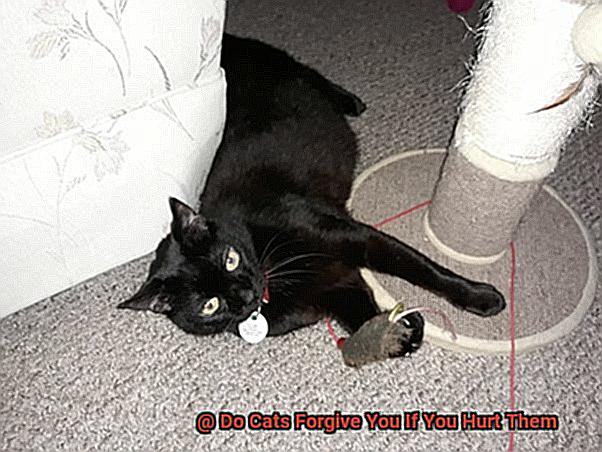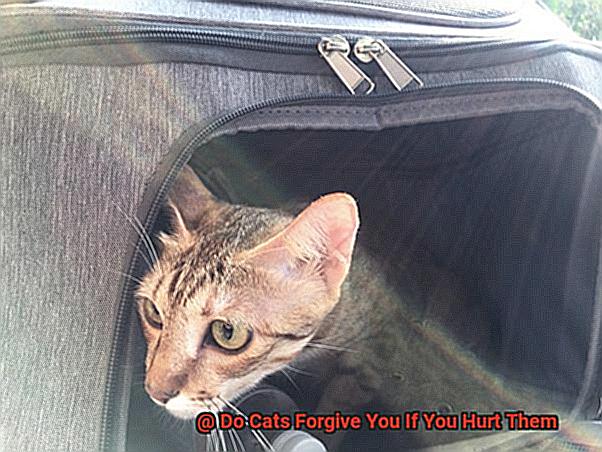Cats are fascinating creatures with a reputation for being aloof and independent. They seem to live by their own set of rules, which can be both mysterious and endearing. However, as any cat lover knows, these furry friends are more than just pets – they are family members who can form deep bonds with their human companions.
But what happens when we accidentally hurt our feline friends? Do cats forgive us for our mistakes? It’s a question that many pet owners ask themselves, especially when they’ve inadvertently stepped on a tail or neglected to play with their kitty as often as they should.
While cats may seem stoic and indifferent at times, they are capable of feeling intense emotions that can be complex and challenging to understand. Some cats may hold grudges and display signs of anger or withdrawal after being hurt or upset. Others may bounce back quickly and show no ill effects from the incident.
So, how do you know if your cat has forgiven you for your mistake? And what can you do to rebuild trust with your feline companion? In this blog post, we’ll explore these questions in detail, delving into the science behind feline behavior and sharing practical tips for strengthening your bond with your furry friend.
Whether you’re a seasoned cat owner or new to the world of feline companionship, this topic is sure to be both fascinating and informative. So settle in with your favorite cup of tea or coffee and join us on this journey of discovery – we promise it will be worth it.
What is the Nature of Cats?

From their independent and curious nature to their hunting instincts, cats possess a complex and multifaceted nature that is fascinating to explore. These adaptable creatures have evolved to become skilled hunters, as evidenced by their behaviors of stalking, pouncing, and playing with toys.
Moreover, cats are highly territorial creatures, and they mark their territory by rubbing their scent glands on surfaces and scratching them. This behavior helps them establish boundaries and communicate with other cats.
While some may perceive cats as aloof or independent, they can also be affectionate and form strong bonds with their owners. However, this affection is often on their own terms, and cats may choose when to interact with their owners or seek attention. You may notice your cat showing affection by grooming you or bringing you “gifts” such as dead prey.

But what about forgiveness? Contrary to popular belief, cats are capable of forgiving. While it may take time for them to let go of past experiences and initial reactions of fear or aggression, they can learn to associate positive experiences with their owners through patience and positive reinforcement.

In conclusion, understanding the natural instincts and behaviors of cats can help cat owners provide a suitable living environment that meets their needs. And if you want to strengthen your bond with your feline companion, remember that forgiveness is achievable with patience and positive reinforcement.
Do Cats Have the Capacity to Forgive?
Some swear their feline friends hold grudges, while others claim their cats are quick to forgive and forget. As a cat expert, I can tell you that the truth lies somewhere in between.
Cats are intelligent animals that are capable of learning from their experiences. If they’ve been hurt or mistreated, they may remember the experience and become wary of the person who caused the harm. However, cats are also creatures of habit and positive reinforcement can go a long way in strengthening your bond with them.
But here’s the thing: cats have different personalities and temperaments, just like humans do. Some cats may be more forgiving than others, depending on their individual experiences and temperament. So while some cats may hold onto a grudge for longer than others, it doesn’t mean they can’t eventually move on.

So how can you rebuild trust with your cat after a negative experience? The answer is simple: consistent positive experiences and gentle treatment. Cats can be easily swayed by positive experiences, so if you consistently treat your cat with kindness and affection, they are likely to overlook past offenses and form a positive relationship with you again.
It may take time, patience, and understanding to strengthen your bond with your feline friend after a negative experience. But remember that cats do have the capacity to move on from past hurts.
How Long Does it Take for a Cat to Forgive?
Well, the answer to this question is not a simple one. The length of time it takes for a cat to forgive can depend on several factors such as the severity of the offense and the bond between the cat and the person who has hurt them.
Cats are sensitive creatures that possess long memories. They may associate certain actions or situations with past hurt or trauma, making it challenging for them to forgive easily. Therefore, it’s essential to give them time and space to process their emotions after being hurt.
If the cat has a strong bond with their human, they may be more likely to forgive them sooner. However, if someone else caused the hurt or if the cat doesn’t have a strong bond with their human, it may take longer for them to forgive.
To rebuild trust and form a positive relationship with your feline friend again, consistent positive experiences and gentle treatment are essential. You can offer extra attention and treats or give them some alone time to decompress. With patience and understanding, most cats will eventually forgive and move on from past hurts.
In conclusion, how long it takes for a cat to forgive is a process influenced by several factors. As a cat owner, you should be patient, kind, and understanding towards your feline friend.
Factors That Affect a Cat’s Ability to Forgive
These sensitive creatures have long memories, and past trauma or hurt can make it difficult for them to let go. So, what are the factors that affect a cat’s ability to forgive? Let’s take a closer look.
Firstly, the severity of the harm done to a cat is a significant factor. If the harm was minor, like accidentally stepping on their tail, your cat may be more likely to forgive and forget quickly. However, if the harm was severe, such as intentional abuse or neglect, it may be much harder for your cat to forgive and rebuild trust.
Secondly, personality and temperament also play a role. Some cats are naturally more easy-going and forgiving, while others may be more sensitive and hold grudges for longer periods of time. Age can also be a factor as older cats may find it harder to adapt to new situations.
Thirdly, the relationship between the cat and their owner is essential. If your cat has a strong bond with you and feels loved and cared for, they may be more likely to forgive mistakes. However, if your cat doesn’t feel safe or secure in their environment, it may take longer for them to forgive.
Lastly, consistency and positive reinforcement go a long way in improving your cat’s ability to forgive. Consistently showing love and care towards your cat while providing positive reinforcement for good behavior can help build trust and strengthen your bond.
In conclusion, there are many factors that affect a cat’s ability to forgive. As a responsible pet owner or lover, understanding your feline friend’s personality and needs is vital for building a strong relationship based on love, trust, and consistency.
Rebuilding Trust After Hurting Your Cat
However, the good news is that you can rebuild trust with your cat with just a little bit of patience, understanding, and effort.
The first step in rebuilding trust is acknowledging your mistake and apologizing to your cat. Cats are perceptive creatures, so speaking softly and gently stroking their fur can go a long way. It is vital to remain calm and patient during this process since cats are highly sensitive to human emotions.
To rebuild trust effectively, you must make changes to the environment that caused the injury. If a particular toy or a piece of furniture was the culprit, remove it from the home. Additionally, avoid any actions that may scare or harm your cat such as sudden movements or loud noises.
Consistency is key when rebuilding trust with your cat. Maintain a consistent routine and provide them with love and attention every day. This can include grooming, playing, and spending quality time together.
Positive reinforcement is another crucial aspect of rebuilding trust. Rewarding your cat with treats, toys, and affection when they exhibit good behavior can help reinforce positive associations with you. Respond positively to their cues and signals, providing them with the attention they need.
In some cases, seeking professional help from a veterinarian or animal behaviorist may be necessary to rebuild trust with your cat. They can provide guidance on specific techniques to use and offer support throughout the process.
Remember that rebuilding trust takes time, effort, and patience. Approach the process with a positive attitude and keep in mind that every step forward is progress.
Understanding that Forgiveness Doesn’t Necessarily Mean Forgetting
The answer is a bit complicated, as forgiveness doesn’t necessarily mean forgetting. While cats may not hold grudges against their owners, they often remember the incident and feel cautious or scared around them in the future.
Cats have a remarkable memory and can recall past experiences with their owners. If a cat has been hurt by their owner, they may associate that person with pain or fear, which can affect their behavior towards them. However, this doesn’t mean that the cat is unforgiving, but rather that they are cautious and protective of themselves.
So how do you go about rebuilding trust with your feline friend after an incident? First and foremost, it’s crucial to take responsibility for your actions and not expect your cat to simply forget what happened. Building trust with a cat takes time and patience. Give your cat space and allow them to approach you on their own terms.
It’s also important to make positive associations with your cat by offering treats and playing with them in a gentle manner. By doing so, you can help your cat feel safe and loved again. However, it’s essential to understand that it may take some time for your cat to overcome their fear or apprehension.
In conclusion, forgiving doesn’t necessarily mean forgetting. Cats have an exceptional memory and may remember past experiences with their owners.
VFFjjbxy3HA” >
Conclusion
In conclusion, the answer to whether cats can forgive their owners after being hurt is not black and white. Cats do have the ability to forgive and move on from past hurts, but the time it takes for them to do so can vary based on several factors. These include the severity of the harm done, the cat’s personality and temperament, their relationship with their owner, and consistency in positive reinforcement.
Rebuilding trust with your feline friend after an incident requires patience, understanding, and effort. The first step is acknowledging your mistake and apologizing to your cat. Additionally, removing any environmental triggers that caused the injury and providing consistent love and attention are crucial components in rebuilding trust.
It’s important to remember that forgiving doesn’t necessarily mean forgetting. Cats have remarkable memories and may associate past experiences with pain or fear. However, through patience and positive reinforcement, most cats can overcome their apprehension and form a positive relationship with their owners again.
As responsible pet owners or lovers, it’s essential to understand our feline friends’ natural instincts and behaviors for building strong relationships based on love, trust, and consistency.







